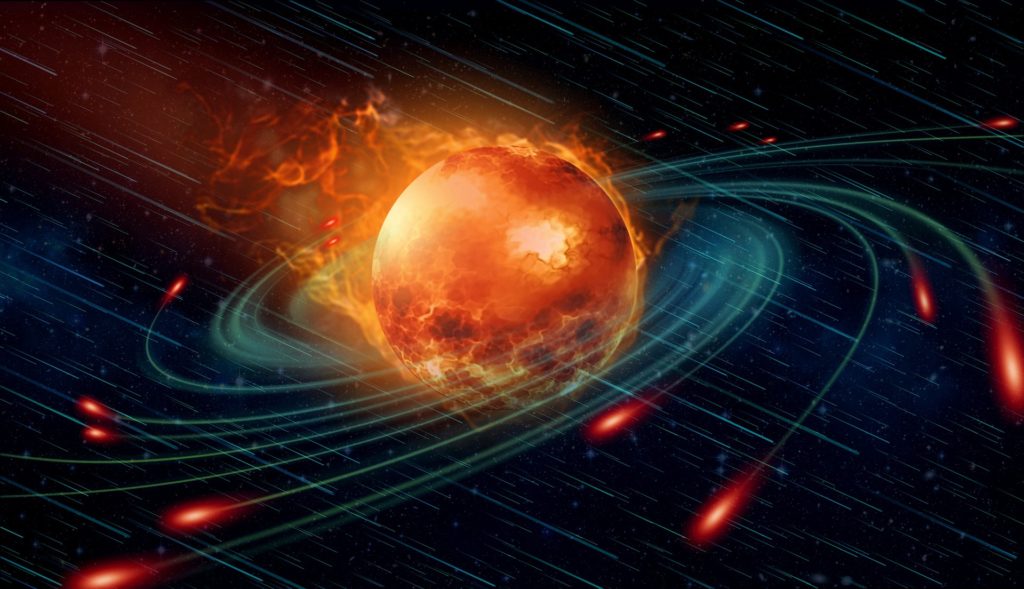Building a planet used to be harder.
There was a real art to it once, Joseph remembers. Years of stellar engineering and geo-architectural study, of course, but also something more than that, something indefinable: raw talent polished to a diamond’s edge. Back then, the spacefaring guild paid handsomely for that kind of artistry, that kind of prodigious talent, if only you were the kind of planet-builder who could master it.

Nowadays, you can build a planet out of a box kit. Almost anybody can, with just a small orbital ship and a choice investor. There’s no ounce of artistry involved at all.
There’s also no guild left, Joseph thinks, which is the only reason he’s stuck out here doing clean-up duty in the first place.
He taps the viewscreen of his own orbital ship gently, pinging the data net. Three of the messenger birds he sent out to the planet below haven’t returned, nor even relayed preliminary data through the temporary satellite ring. Still, it’s too early to read anything into that, much less leap to any kind of conclusions. Instead he scrolls through the handful of atmospheric readings that have already returned and compares them against the design packet the client uploaded to his ship’s computer before departure.
What he sees is troubling, to say the least, and it’s little wonder they were willing to pay so much, and so quickly, to procure his services. Joseph didn’t build this planet himself, of course, but even at a glance he could tell it was a hack job, barely stable tectonics and unbreathable air, the kind of hurried and half-measured work that would have gotten him laughed out of the guild. It’s only gotten worse down there in the standard month since they built the thing: primordial atmosphere starting to strip away, but at nowhere near the rate they’ll need if the client actually wants to mount a settlement anytime this century.
That’s what you get from trusting in box kits, Joseph thinks. Better to write off the cost and just bomb the rock out of the sky.
Why they even built it out here, he doesn’t know. There are exo-planets aplenty in nearby sectors, and nothing particular to recommend this one. No established trade routes, no mining prospects, not even a sun they didn’t have to cart in and build from scratch themselves. At least that jury-rigged fusion reactor looks stable enough, but that’s only because they outsourced the tiny ersatz star to a more reputable crew. (Joseph recognizes his old competitor’s handiwork.) If the client wanted a settlement in this part of space so bad, they had a lot of other options that didn’t involve store-bought planets in the first place.
But then the last of his messenger birds radio back and he finally understands. It’s all right there in the data. The coalescing atmosphere, the unsteady core composition, the telltale footprint of prokaryotes where there shouldn’t yet be any. They’ve got the whole thing half-backwards, too much seasoning in the primordial soup, but it’s suddenly clear to Joseph what they thought they were trying to do.
They were trying to build another Earth.
No wonder they wanted to tuck it away where no one would see it.
Back when there was a guild, Joseph would have warned clients away from this kind of mad folly. He’d never have taken this commission. Planetary construction is about architecture, engineering, house-building. Anybody who promises you more than that should have their license revoked or their head examined. A planet-builder can give you the house, even a beautiful one, but if what you really want is a garden—a bona fide, workaday, terrestrial settlement—then you can’t cut corners like the client tried to do here. You can’t expect your new Earth to do the work for you. You need to seed the planet, well after the initial assembly, with the basic building blocks of life that you’ve brought in from off-world.
Nobody’s ever had any luck getting a bespoke planet to spontaneously create a biome on its own. Not in any sustainable way, at least, and certainly nobody equipped with just a box kit. Even the guild, when it was collapsing in on itself and desperate for work, wouldn’t have pretended they could coax a planet into creating life all by itself.
Joseph has to laugh, and not simply because he knows his hourly rate has just gone up. It’ll take weeks, maybe even months, to fix what they’ve done wrong here. The client thought they’d be able to skip a few steps, forgo that costly seeding process and still get their hands on a new world they could safely live on. Instead, what’s down there is a broken and dangerous mess. Some scattered pockets of unicellular lifeforms, sure, but nothing that’ll last or make it past even the mildest of extinction events.
It’s going to take a lot of extra work to make this planet anything like habitable.
But Joseph thinks he’s up to the task. Now that he understands exactly what’s gone awry with the build, he thinks there’s a clear way to salvage the place. Maybe even re-introduce a little artistry in the process, do his old guild-mates proud.
There’s no way it’ll come cheap, but then again, it also won’t be the end of the world.
This story first appeared in Heavy Metal Jupiters – Friday
Edited by Marie Ginga.
Fred Coppersmith's fiction has appeared previously or is forthcoming in Andromeda Spaceways, Stupefying Stories, and Bourbon Penn, among others. He toils by day the wilds of academic publishing and also edits and publishes the quarterly zine Kaleidotrope.

